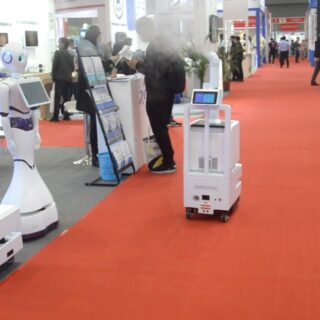HOW AI WILL SHAPE THE EXHIBITION INDUSTRY? 7 SCENE APPLICATIONS
Many of you may have played around with ChatGPT over recent and experienced the powerful potential of artificial intelligence in our lives.
The exhibition industry has always been at the forefront of showcasing innovation and pushing boundaries when it comes to technology. From immersive displays to interactive exhibits, exhibitions have constantly evolved to captivate audiences and deliver memorable experiences. Now, a new technological revolution is poised to transform the industry once again: Artificial Intelligence (AI).
AI has already made significant strides in various sectors, including healthcare, finance, and transportation. Its ability to process vast amounts of data, learn from patterns, and make intelligent decisions has immense potential to revolutionize the way exhibitions are planned, executed, and experienced. Let’s explore how AI will shape the exhibition industry.
1. Enhanced Visitor Experience:
AI can significantly enhance the visitor experience by personalizing interactions and tailoring content to individual preferences. Through facial recognition technology, AI can identify visitors and provide them with personalized recommendations and information. For example, an AI-powered exhibition system can analyze a visitor’s demographics, interests, and past behavior to suggest relevant exhibits, workshops, or networking opportunities, ensuring a more engaging and targeted experience.
2. Intelligent Data Analysis:
Exhibitions generate massive amounts of data, including visitor demographics, footfall, and engagement metrics. AI can analyze this data in real-time, providing valuable insights to exhibitors and organizers. By harnessing AI algorithms, exhibition planners can gain a deeper understanding of visitor behavior, preferences, and trends. This knowledge can be used to optimize booth layouts, refine marketing strategies, and improve the overall exhibition experience.
3. Virtual Assistants and Chatbots:
AI-powered virtual assistants and chatbots can be integrated into exhibition platforms to provide instant assistance to visitors. These intelligent bots can answer frequently asked questions, provide directions, and offer real-time information about exhibitors, schedules, and events. By utilizing natural language processing and machine learning, chatbots can understand and respond to visitor inquiries, creating a seamless and efficient experience.
4. Intelligent Automation:
AI can automate various manual and repetitive tasks involved in exhibition management, freeing up resources and streamlining operations. For instance, AI-powered systems can automate registration processes, ticketing, and even lead generation. This allows exhibitors and organizers to focus more on delivering a high-quality exhibition experience while minimizing administrative burdens.
5. Immersive Technologies:
AI can amplify the impact of immersive technologies, such as virtual reality (VR) and augmented reality (AR), within exhibitions. By integrating AI algorithms, VR and AR experiences can adapt and respond to visitor behavior, creating personalized and dynamic simulations. AI can also analyze user interactions within these immersive environments, providing valuable insights for future improvements.
6. Predictive Analytics:
AI’s predictive capabilities can help exhibition organizers make informed decisions and optimize resource allocation. By analyzing historical data, AI algorithms can forecast visitor attendance, estimate demand for specific exhibits, and identify potential bottlenecks or areas for improvement. This data-driven approach enables better planning, resource optimization, and improved return on investment (ROI).
7. Remote Participation:
AI can facilitate remote participation in exhibitions, allowing people from around the world to engage with the event virtually. Through AI-powered platforms, exhibitors can deliver immersive and interactive experiences to remote participants, bridging the gap between physical and virtual exhibitions. This opens up new opportunities for collaboration, knowledge sharing, and global reach.
In conclusion, AI is set to reshape the exhibition industry by revolutionizing the visitor experience, optimizing operations, and unlocking new possibilities. By leveraging AI’s capabilities in personalization, data analysis, automation, and immersive technologies, exhibitions can become more engaging, efficient, and inclusive. As AI continues to advance, we can expect to witness even more groundbreaking innovations that will shape the future of the exhibition industry for years to come.

